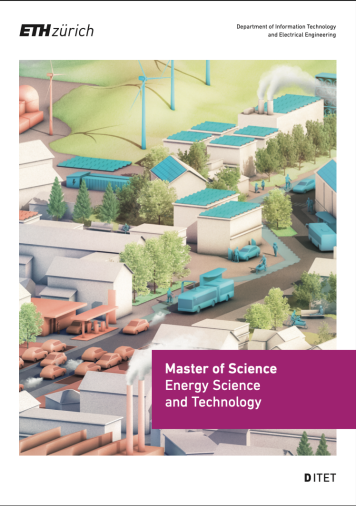About MEST
The Master's degree programme in Energy Science and Technology (MEST) is a unique opportunity to understand the production and use of energy in our society.
The ability to harness energy resources, together with the ability to walk upright and use tools, is what chiefly distinguishes humans from animals. Today’s pre-industrial societies still rely heavily on the most basic form of energy conversion: fire. Modern societies cannot conceive of living without energy, even for a limited time, and nations have long waged war in order to secure energy resources.
Can we produce environmentally friendly energy? How do we know that an energy system is reliable, of low risk, economically viable, socially compatible, and resilient in the face of natural catastrophes?
The MEST programme offers students a choice of studies addressing the technical, environmental, economic, societal or political aspects of a sustainable energy system, equiping themselves to contribute towards shaping our future.
The programme, offered by ETH Zurich, is coordinated by the Departments of Information Technology & Electrical Engineering (host department) and Mechanical & Process Engineering, in collaboration with the Department of Management, Technology, and Economics and is supported by the Energy Science Centre.

All aspects of the MEST programme are conducted in English.

The aims and benefits of the programme, plus alumni testimonials and course pre-requisites can be found in the
Watch the recording of an informal Zoom event held in Fall 2022 aimed at informing prospective students: the MEST programme director (Prof. Christian Franck, D-ITET) and the MEST Programme coordinators (Reto Kreuzer, D-ITET & Katharina Bosina, ESC) are joined by a MEST graduate, Xuqian Yan, outlining how she benefitted from the course. Download Watch the video here (MP4, 339.1 MB).
More detailed information about the programme structure is available on the Degree & Documents page.
Transformations in the Energy sector
The transition towards a more sustainable supply and use of energy requires drastic change within the energy sector. This poses significant challenges across all aspects of integrated energy production, distribution, the economic context and the global interdependencies. The MEST programme provides you with the fundamentals needed to tackle these complex challenges.
Traditionally, for many years, power generation simply followed load demand. Storage units were used mainly for techno-economic optimisation, allowing large base-load power plants such as nuclear or coal-fired power plants to operate at a constant and full- load operation point despite the fluctuating pattern of load demand. The remaining variations between scheduled generation and actual real-time load demand, caused by stochastic effects on both generation- and demand-side, were balanced via reserve capacities.
In recent years, this is changing due to a number of reasons:
- The widespread deployment of variable Renewable Energy Sources (RES) (solar, wind, thermal, biomass) in many countries has led to a significant share of highly fluctuating power generation that is not easily controllable.
- The growing energy market activity on the increasingly integrated national and trans-national energy markets has led to more frequent changes in the operating set-point schedules of power plants.
- The emergence of smart grids as a driver for change in power system operation at all grid levels.
Collectively, these developments constitute a major paradigm shift in the management of energy generation and load portfolios: in the future load demand will increasingly have to follow the fluctuating power generation of RES.
As this transition will require drastic changes in the energy sector, it is critical to understand, evaluate and quantify the micro- and macro-economic implications of such a transition. Effective and robust energy policies in today’s market economies have to recognise the role of economic incentives in determining the energy supply and demand decisions of firms and households in various sectors of the economy, as well as in international markets.
Future market environments should be designed to ensure adequate investment incentives for electricity generation and transmission capacity and to guarantee sufficient temporal and spatial flexibility of power generation in light of fluctuating renewable energy sources. The dynamic aspect of the energy transition further entails considering the macroeconomic drivers and mechanisms for economic growth and their interrelationship with specific aspects of the energy sector such as, for example, technological innovations, resource costs, capital intensity and market structures.
In addition to these regional challenges, the supply of energy is becoming increasingly dependent on global interdependencies. For instance, the discovery and exploration of shale gas in the U.S. has an influence on the price of globally traded and transported coal, which in turn influences the price of electricity produced in coal-fired power stations in Europe.
Understanding the energy challenges of tomorrow means understanding these interactions between different energy producers and carriers in different spatial and temporal dimensions.

Specificities of the MEST Program
Who Can Apply?
MEST strives to accept students from diverse backgrounds, but it is mainly the students holding a Bachelor’s degree in engineering or natural sciences with a strong academic performance from a nationally or internationally reputed university who have a good chance of being admitted to the course. To be considered, the candidate’s Bachelor’s degree should comprise the following courses (although a deviation of up to 6 ECTS credit points is allowed):
- Mathematics: an equivalent of 26 credit points or more
- Physics: an equivalent of 10 credit points or more
- Engineering Sciences: an equivalent of 24 credit points or more (mechanical/electrical engineering, informatics, systems/control, etc.)
- Economics: an equivalent of 3 credit points or more
The Role of the Tutor
The Master's degree programme in Energy Science and Technology (MEST) is a tutor driven programme, meaning that each student is supervised by a tutor. New students choose their tutor before the start of the first semester.
The tutor:
- Supports the student in planning their individualised curriculum and completing the Tutor/Learning Agreement;
- Supervises the semester project or the master thesis (these should be supervised by two different Professors).
- May help the student with questions concerning the industrial internship.
Furthermore, tutors will coach their students throughout the programme, monitoring their progress and, if required, propose any necessary measures to enhance their performance.
As soon as a place on the MEST programme has been confirmed, each new student is invited to submit the names of three possible tutors in preference order. The student will have made this selection based on the tutors' research and teaching activities, ensuring that there is an overlap of interests.
The list of available tutors can be found on our Tutors page. The student sends their prioritised list of preferred tutors to the Energy Science Center (ESC) who, in turn, contacts the tutors in the prioritised order. If a tutor accepts, the ESC confirms this to the student before the semester starts. In the rare event that none of the three tutors accept, the ESC contacts the student directly to find an alternate tutor.
Once a tutor has been confirmed, the student must contact the tutor prior to the start of the first semester to make an appointment to plan their academic programme with them.
Exceptionally, and with the agreement of both the original tutor and the new one, a student can change their tutor.
If this happens, the student should email Dr. Christian Schaffner (ESC Executive Director) with a Cc to the D-ITET Coordinator of Studies Reto Kreuzer, and update their Tutor/Learning Agreement accordingly.
Additional guidance can be gained from the D-ITET Student Office.
The Tutor/Learning Agreement is an individualised study plan, listing the courses (both compulsory and elective) that the student will take during the MEST programme.
The compulsory courses must be selected from the courses offered.
The elective courses can be freely chosen, in agreement with the tutor, from any energy-related courses on offer at ETH Zurich.
None of the other credit categories of the MEST programme - the Science in Perspective (D-GESS) courses, the semester project, the internship, and the master thesis - are included in the Tutor/Learning Agreement.
MEST students, together with their tutor, need to complete the Tutor/Learning Agreement within the first four weeks of the first semester. The Tutor/Learning Agreement is updated online via myStudies following these guidelines: Download MEST myStudies Tutor/Learning Agreement (PDF, 1.1 MB)
Buddy system
Are you thinking about joining MSc Energy Science and Technology (MEST) programme but feel that you would like a person you can contact for answering all your questions? Or have you already decided to come to ETH Zurich but want someone you can meet before the new semester starts? This is what our Buddy System is for!
A Buddy is a MEST student in their first or second year who wants to help an incoming new MEST student to get oriented and feel welcomed in Zurich and at ETH. They will be available for questions from admission until the first weeks of the next Autumn semester.